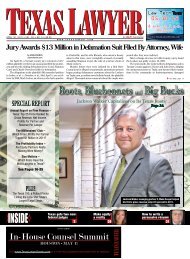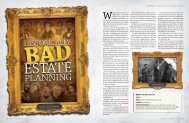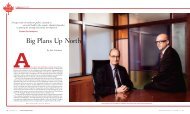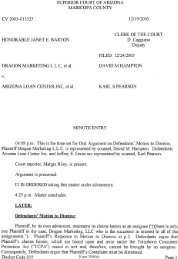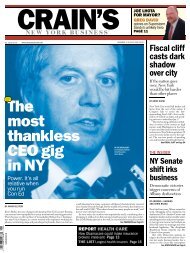ISN'T IT RICH? - American Business Media
ISN'T IT RICH? - American Business Media
ISN'T IT RICH? - American Business Media
You also want an ePaper? Increase the reach of your titles
YUMPU automatically turns print PDFs into web optimized ePapers that Google loves.
WilmerHaleDiscoverySolutions.comrespondents offered such training for practicegroup leaders, but only 13 percent madeit mandatory. Among firms with 500 or morelawyers, all offered training to their groupleaders, but only one-third of those firms requiredit. This is a missed opportunity.The key is to do a few things better thatwill render significant improvements in practicegroup effectiveness. They are: DEFINE ROLES PROPERLY AND CLEARLY. Lawfirm practice groups were initially conceptualizedas externally oriented—groups of lawyersfocused on clients, strategy, competitiveness,and growth. However, over the last 15 yearsmany practice groups have morphed into internallyoriented operational units that existprimarily for administrative, organizational,and management purposes. The survey showsroughly a fifty-fifty split between internal andexternal group orientation in today’s law firms.While internal management of administrativematters is important, it should not be apractice leader’s main focus. Those tasks shouldbe delegated to deputies within the groups and/or to nonlawyer personnel and professionals.Group leaders will never be as effective as firmswant them to be, and as they should be, unlessthey are unburdened from administrative tasks.A first step is reviewing the practice leader’sjob description. It should not include dozensof areas of responsibility. Rather, it should articulatea clear set of areas to focus on that willmove the group forward competitively by acquiring,retaining, and increasing business, andby building and sustaining market position. ENSURE THAT TIME IS USED WISELY. Mostfirms expect that their practice leaders willspend enough time on practice group duties,but few firms demand it. In our experience,many managing partners just assume that professionals,being professionals, will do the rightthing, and thus there is little need for closemanagement. This assumption is not correct.In addition, simply setting an expected numberof hours for leaders to spend on practice grouptasks and activities is insufficient. They need tospend time on the right things.To achieve this, senior leadership (managingpartners and others) must communicate withpractice leaders in an effective way. This mightinclude coaching, encouragement, and othermeans of motivation. Effective interaction withsenior management that includes ongoing faceto-facecommunication is usually a clear predictorof how successful practice leaders will be.Busy professionals almost always have goodintentions. They intend to get the right thingsdone, but it is all too easy to move from crisisto crisis and overlook important issues. Senior54 March 2012 | americanlawyer.comleadership should be the catalyst for keepingpractice leaders on track and focused on thoseinvestments that will benefit their groups inthe long term.Providing practice leaders with adequatetraining on leadership and plan formulationwill also be invaluable as they make decisionsabout how to use their time most effectively. TAKE LEADERSHIP DEVELOPMENT SERIOUSLY.Leadership development works best in firmsthat recognize the need for continual and tailoredskills training. New practice group leadersprobably require 30–40 hours of leadershipand management training over the first twoyears. More experienced leaders may need less.Our experience is that the best firms have individualleadership development plans for all oftheir leaders, customized to the specific needsof each person.Along with the training, there must be aneffective and robust evaluation program forpractice leaders. At a minimum the groupleader should be evaluated for developmentof a group plan and how well group memberscarry out the plan. Firms should evaluate howwell group members are carrying out their individualplans (if they have them), achievingany articulated metrics (beyond billable hoursand revenues), and exhibiting leadership skills.Providing coaches for practice leaders, especiallynew ones, can be very effective. It isimportant that new leaders develop and sustainthe right behaviors and not be distractedby things that will not enhance the group’scompetitiveness. EMPHASIZE PLANNING. The survey showedthat only 63 percent of firms have a formalpractice group planning process. In the absenceof planning, not much is going to happen.Every firm should install, support, and sustainan effective planning process. This shouldnot be an overwhelming, bureaucratic, or formulaictask. The program should assure collaborationamong group members and sharing ofplans with other group leaders to promote collaborativeactivities like cross-selling. The bestplans will be short, focused, and achievable.Regular one-on-one communication withsenior management and periodic evaluation ofefforts and results is essential to maintainingthe plan’s effectiveness. At larger firms, thisoversight should not be the managing partner’sresponsibility. Instead, another seniorleader should be designated to support thepractice group functions. Other departments,such as human resources, <strong>IT</strong>, and finance willneed to be involved as well. HOLD GROUP LEADERS ACCOUNTABLE. Oneof the biggest reasons that practice leaders fallshort of expectations is that senior leadershipfails to hold them accountable. If a firm wantspractice leaders to get things done, it mustmove beyond a policy of hope and into therealm of effective accountability.A firm cannot hold group leaders accountablefrom afar. It cannot do it through e-mailsand memoranda. It can only be done throughongoing personal interaction. Accountabilityin a professional services environment doesnot take the form of threats, nor can it be accomplishedthrough incentives like compensation.Rather, it results from finding the thingsthat motivate each professional to get the jobdone, inspiring them to act and, when necessary,coaching them on how to get there.Role clarity, leadership skills, effective planning,and sufficient time to focus on the needsof the group are the key components of a results-orientedpractice group program. Otherissues, like good leadership selection, appropriatecompensation adjustments for practiceleaders, and useful management data on groupperformance, should also be considered.Each of these considerations is interdependent.Executed correctly, the pieces will meshto improve practice group performance. A failureof any part will affect the entire dynamic.The ultimate driver is sustained accountability—andthat must come from the firm’s seniorleadership.Our experience, along with these surveyresults, tell us that law firms currently seepractice group performance as important—but not that important. Investments in training,planning, time, and resources aren’t beingmade at the levels they should be. There is notthe degree of accountability needed to createreal excellence.What is an acceptable practice group returnon investment for law firms? Returningto the corporate analogy, what percentage ofproduct lines or departments should receive a“very good” or “excellent” rating in a healthy,thriving business? We think 80–85 percent is areasonable expectation. The bar is high—butthe path is clear.In a time in which law firms face evergreatercompetition, practice group performanceshould be recognized as a way to achievea competitive advantage. As with all performance-improvementinitiatives, the firms thatrealize this first, and act upon that realization,will set themselves apart.Thomas S. Clay is a principal with managementconsultancy Altman Weil, Inc. He advises lawfirms on strategy and leadership. E-mail: tsclay@altmanweil.com.Precision. Speed. Value.E-discovery that hits the mark.WilmerHale clients demand innovative and efficient solutions to their e-discovery challenges.Our unique document review strategy puts today’s foremost predictive coding technology in thehands of the smartest lawyers in the profession. The result? Superior accuracy. Exceptional value.A quantum leap in efficiency. WilmerHale DiscoverySolutions. Revolutionizing e-discovery.DiscoverySolutionsAttorney Advertising. Wilmer Cutler Pickering Hale and Dorr LLP is a Delaware limited liability partnership. WilmerHale principal law offices: 60 State Street, Boston, Massachusetts 02109, +1 617 526 6000; 1875 Pennsylvania Avenue, NW, Washington,DC 20006, +1 202 663 6000. Our United Kingdom offices are operated under a separate Delaware limited liability partnership of solicitors and registered foreign lawyers authorized and regulated by the Solicitors Regulation Authority (SRA No. 287488).Our professional rules can be found at www.sra.org.uk/solicitors/code-of-conduct.page. A list of partners and their professional qualifications is available for inspection at our UK offices. In Beijing, we are registered to operate as a Foreign Law FirmRepresentative Office. This material is for general informational purposes only and does not represent our legal advice as to any particular set of facts; nor does it represent any undertaking to keep recipients advised of all relevant legal developments.Prior results do not guarantee a similar outcome. © 2012 Wilmer Cutler Pickering Hale and Dorr LLP







